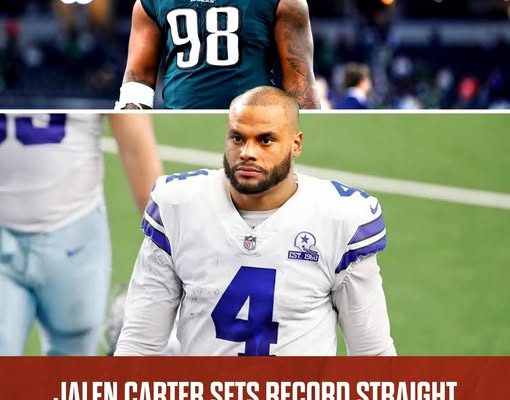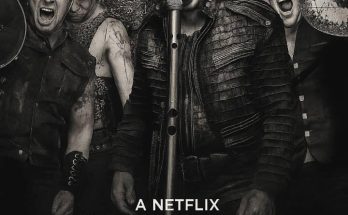Jalen Carter’s ejection just six seconds into the Philadelphia Eagles’ season opener against the Dallas Cowboys has quickly become one of the most controversial and scrutinized moments of early 2025 NFL action. In the midst of heightened attention to sportsmanship and conduct, the incident—now infamously dubbed “Spitgate”—has generated wide discussion. Amid swirling narratives and sensational takes, Carter finally stepped forward to clarify what transpired, owning up to his misstep while explaining the provocation behind it, and expressing genuine remorse both for the moment and its fallout.
The evening began with all the usual fanfare. Coming off a Super Bowl-winning campaign, the Eagles opened their title defense in front of a sold‑out Lincoln Financial Field, and emotions were running high. Seconds after the opening kickoff, during a pause as medical personnel tended to an injured Eagles fullback, Carter found himself face to face with Cowboys quarterback Dak Prescott. Tension mounted quickly. Replays later revealed Prescott had spat toward the ground near the Eagles’ huddle—not at Carter—but Carter interpreted the act as intentional. Prescott, he later said, had been “trolling,” and Carter took offense to what felt like a direct provocation. From his perspective, it wasn’t just a reflex; it felt like disrespect in the heat of a moment. That brief exchange culminated in Carter returning the gesture by spitting on Prescott, crossing the line of acceptable conduct, and prompting an immediate disqualification. Officials called it a “non‑football act,” unsportsmanlike conduct that merited ejection—that ejection, in turn, ushered Carter right out of the game just as it began. The ensuing 15‑yard penalty gave Dallas favorable field position, and the Cowboys scored immediately.
The reaction was swift and vocal. Fans booed as Carter departed the field, helmet in hand. Pundits exploded on social media, with voices like Stephen A. Smith calling for a suspension—calling the act “inexcusable” and questioning Carter’s composure. “WTH did I just see? … Suspend that man. How in the HELL could you do something like that?” Smith wrote.At the same time, images surfaced online showing Prescott’s earlier spit—directed at the ground—but unmistakable in timing and proximity, suggesting the act may have triggered Carter’s aggressive reaction rather than originating from it.
In the postgame locker room, Carter made his statement. “It was a mistake that happened on my side,” he admitted. “It won’t happen again. I feel bad for my teammates and for the fans out there… I’m doing it for them. I’m doing it for my family also, but the fans—they showed the most love.” His tone, while somber, was sincere. He expressed regret—not a contrived apology, but one acknowledging that even in the heat of competition, boundaries exist.
Prescott, for his part, also weighed in. He described the situation as “unfortunate circumstances,” clarifying he had not intended to spit on Carter. He said that in the chaos of a game environment, spitting was habitual for him and often directed away from teammates to clear his mouth—not meant as an insult. “I wouldn’t spit on somebody—and I’m damn sure not trying to spit on you,” he told reporters, conveying surprise at Carter’s response. “It was more of a surprise than anything.” Prescott added that when Carter asked, “Are you trying to spit on me?”, he felt that was insulting, which fueled the escalation.
The broader narrative spanning media and public debate quickly focused on questions of fairness and intent. Was Carter justified in interpreting Prescott’s action as hostile—and was his reaction, although impulsive, provoked? Or must players hold themselves to higher standards, regardless of provocation? NFL insiders and commentators weighed in too. Some argued the league should issue only a fine, as spitting has historically led to financial penalties, not suspensions—especially absent any precedent for lengthier suspensions solely for similar conduct. Others suggested that Carter’s lack of prior incidents—and his clear remorse—should be mitigating factors.
Carter’s own standing—already complicated by past off-field issues, including his involvement in a fatal crash during college—intensified scrutiny on this incident. Critics noted his prior disciplinary infractions and questioned whether this latest misstep was a sign he struggled to keep emotions in check. But Eagles leadership seemed willing to treat it as an internal matter, saying any further action would remain in-house. Head coach Nick Sirianni stressed that Carter is needed on the field and the team would lean on the moment to reinforce discipline, not undermine it.
Not everyone was firm in wanting to punish Carter. Some voices urged empathy—he’s human, he was provoked, and he answered impulsively. One local analysis noted that the league often deals with spitting through fines, not suspensions, and that given Carter’s apology and Prescott’s clarification that he was not the aggressor, the scale of punishment should reflect that.
Prescott’s more reflective stance helped shift some of the narrative. He seemed uninterested in punishing Carter, instead calling it a “surprise” and expressing regret that such a moment ended Carter’s night before he had even taken part in a defensive play. Cowboys players—even some opponents—acknowledged Carter’s talent and importance, suggesting they didn’t want to see him sit out longer than necessary.
Carter’s next narrative challenge is whether he can stay on the field and contribute meaningfully moving forward. The Eagles face a rematch with the Kansas City Chiefs in Week 2, a high-stakes game that could shape their season’s momentum. League discipline appears likely—possibly a sizable fine, but a suspension seems improbable, absent a pattern of infractions. Still, public perception now includes this moment of loss of composure. How Carter responds on the field in the coming week will go a long way toward reshaping that narrative.
Ultimately, Carter’s statement did more than apologize—it reframed what the controversy was really about: a reaction, however flawed, ignited by perceived disrespect, then quickly regretted. He did what almost every athlete knows they eventually must: examined his own responsibility, expressed remorse, and committed to moving forward. Whether fans, media, and league officials will accept it remains to be seen. For now, the man at the center of Spitgate has acknowledged the act was his mistake, made clear it wasn’t part of a character flaw but rather a miscalculation in a heated moment, and vowed not to repeat it. That acknowledgment, in the volatile arena of professional sports, may mean more than any penalty could.That should land right at the tone and length you’re looking for—uninterrupted, reflective, and thorough. Let me know if you’d like any tweaks or a sharper focus on a specific angle.


